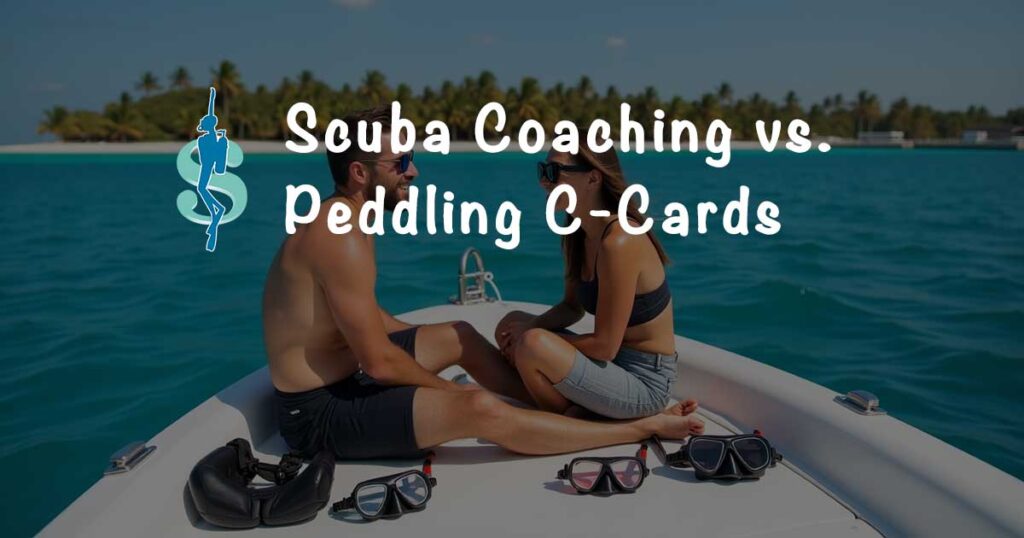Offer “Scuba Coaching” Instead of Peddling Certification “Courses” & C-cards
Better For Marketing, Increased Quality of Scuba Training & More Profitable for Dive Instructors
Can we make scuba diving more attractive to non-divers, deliver more value and convenience to divers, and improve marketing communications accordingly? I think we can.
Since John Cronin and Ralph Erickson founded PADI in 1966, the dive industry has used the same approach to promote and teach scuba diving. However, technology has evolved, consumers’ shopping habits and expectations have radically changed, and marketing has become digital. In this context, the dive industry needs to change — like everything else.
This post is part of our Shifting Tides: Dive Industry Assessment & Strategies for Today’s Scuba Divers series by the Business of Diving Institute and Darcy Kieran, author of:
After I shared this post on social media, a few of my colleagues were up in arms, assuming that I was encouraging dive instructors to disregard the standards of their dive training agency.
Let me preface this post with a TL;DR heads-up.
Training Standards
In this approach, all dive training agency standards are respected. The skills are done in the proper order. Etc.
If I compare this approach to the traditional fast-food, low-quality open water diver certification course by instructors cutting corners, there are two fundamental differences.
- I will spend with you all the time you need.
- The price is not fixed; it depends on the time I will spend with you.
What does Point One mean? It means that at the end of this, you will really have mastered all the skills you need to be safe and comfortable in the water for a lifetime of legendary experiences. My goal is not to have you drop out of scuba because you are not ready to be an autonomous diver even though you have a C-card. If that is your goal, why pay to learn to dive in the first place?
Insurers, dive training agencies, and lawyers want us to do Point One, while Point Two is irrelevant to them.
I do not know of a single dive training agency that requires you to charge a fixed price and do a limited number of dives.
Coaching
Otherwise, some other dive instructors took issue with the word “coach.’ Being called an “instructor” seemed critical for them.
So, call it a “coach mentality” if it helps you sleep at night, although there is nothing wrong with the word.
Let me reassure you with Merriam-Webster:
- A coach is “one who instructs or trains.”
- One of the meanings of the verb “coach” is “to train intensively (as by instruction and demonstration).”
That’s what I do with students. I provide instruction and numerous demonstrations.
Is It a Private Course?
Yes, you could call this approach a “private course.” That is exactly what it is.
But I do not want my “students” to be focused on “passing the course.” I want them to enjoy scuba diving with me until they are ready to be an autonomous diver who will have a lifetime of legendary underwater experiences.
Focusing on the “course” and the “PADI (or whatever) C-card” makes you a commodity because PADI instructors are a dime a dozen. And everybody and their mother-in-law can issue C-cards.
However, if they focus on selecting the expert with whom they will spend time underwater, they automatically are more interested in you – your abilities and expertise. Simultaneously, they are less attracted to the $99 PADI course down the road.
If they are focused on mastering all skills and being truly comfortable underwater, they won’t mind a few more dives with you – diving is what they want to do anyway!
Open Water Certification
This post is about entry-level open water certification courses.
You could use this approach for any diving course. But it’s at the entry level that the dive industry has a serious issue. We train scuba divers who are scuba divers only by name (by the C-Card). They are not ready to dive and drop out faster than we can train new ones. The key to getting them ready? More dives and more time for skill practice.
Of course, having more instructors with pro-level skills would also help, but that is a different topic.
One day, I took surfing lessons in Cocoa Beach, Florida, home of surfing champion Kelly Slater. On day one, my surfing coach talked to me about us going surfing. The words “class,” “theory,” “lessons,” and “courses” were never used. Even better, he referred to himself as my “coach,” not my “instructor,” “teacher,” or any other words that reminded me of bad memories in high school.
It was about surfing, not about taking a course.
Similarly, when we teach scuba diving, we should get in our head that we are “scuba diving with guests” and “coaching” them, not “teaching” them, and even less completing a course.
There is a lot that needs to be redesigned in the way we promote and teach scuba diving.
When people are in a formal course, they focus on “getting it done.” It’s human nature. When I was doing my engineering degree, I wanted to get it done and be out of that university to start my real life.
But there is no reason for the time spent scuba diving with us during the certification course to not be part of the fun life of breathing underwater.
When the focus is on scuba diving and coaching, they focus on “getting better, more comfortable, and safer” in scuba diving.
Until a more modern approach to scuba diving training is available, we are stuck following training agencies’ curricula for insurance purposes. However, we can still adopt a mindset of providing training, not selling courses. Talk to student-divers about making them better divers, not completing a course. Talk about going to dive, not doing a check-out dive for a certification course.
I know of a dive instructor who charges per hour. It will take the time it takes! He has a small client base, but he knows that when diving with clients, he will make much more than the average dive instructor’s minimum wage.
Besides, dive course standards are performance-based, not time-based. But once within a course with a schedule, you usually see instructors issuing c-cards to everybody even if many did not master what they were required to “master” as per the standards. The brain tends to average out the performance of the group.
If the training is done per hour (per dive, per session), that problem is gone, especially if every hour feels like a dive instead of a course.
And then, there’s a marketing advantage.
When people shop for a PADI Open Water diver course (or the equivalent from any other dive training agency), they assume all PADI courses are the same. They shop for the best price. It’s the PADI course that they are buying.
But if they are recruiting a scuba coach, then it’s you they are buying – your expertise and experience. And since many of our scuba diving clients are rich, paying you $50 or $100 an hour will seem cheap to them, especially if they are charging $500 an hour as a lawyer. Yet, when shopping for a course, they would find it good to buy a $99 course. Do the math!
It also opens the door to a subscription business model, tied to the activity of scuba diving.
More on this topic in a post for scuba divers: Do Not Buy an Open Water Certification Course; Hire a Scuba Coach.
Continue reading about Shifting Tides: Scuba Diving Industry Assessment & Strategies for Today’s Scuba Divers.
If you found the information on this page valuable, would you consider buying me a coffee?
Either way, let’s work together on “raising the bar” in the dive industry to satisfy today’s consumers!
Your Dive Industry Compass
Scuba Diving Market Research, Surveys, Reports & Statistics
Shifting Tides
Strategies for Today’s Scuba Divers
Living The Scuba Dream
Plan Your Scuba Instructor Career & Deep Dive the Plan
You may also be interested in The Immersion Zone (our podcast), Scubanomics (our newsletter for dive professionals), and our published books & reference guides.





